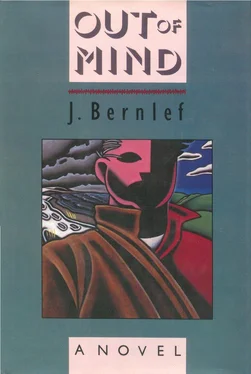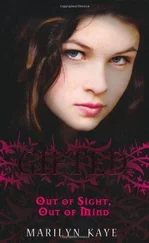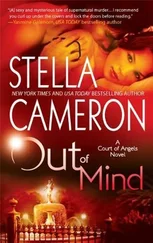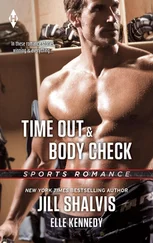Here in Gloucester the school is modern, with large windows through which the children can look out over the bay with its fishing boats or at the mist banks rolling across the sea, swallowing up everything except the flickering lamp of the automatic beacon on the low, rocky islet in the middle of the bay, Ten Pound Island. My own grade school looked more like a brick fortress with tall narrow windows. Class by class you were marched in from the school yard through the solid oak door, up the stairs that smelt of soft soap, and into the classroom with its odour of chalk and old floorcloths, and in winter of wet clothes and briquettes. When I look back on my grade-school days it is as if I were invisible for six years somewhere at the back of the class. Invisible as I listened to the screeching of the chalk on the grey blackboard. Pop sometimes went to the school to ask how I was getting on because I never said anything. I remember he came home in a rage one day because the teacher could form no picture of anyone of my name. It was not until I started studying law that I became a little less invisible, started to talk and very occasionally, at beery debating club evenings, to argue. That was how I came to be invited to join Jan Tholen and Paul Verdaasdonk at a party by one of the canals. There, I met Vera.
I was slightly tipsy, only very slightly, but just enough to give a lengthy account of a play I had seen, The Seagull I think it was. She was sitting on a pouffe with her knees together, her hands clasped over her narrow kneecaps. She was wearing a tight grey skirt and a black sweater. From somewhere in a corner of the room, lamplight fell on the side of her jaw. Strange that of those first moments I remember mostly her kneecaps and her chin, the bony parts. She only listened. She listened while looking at me without interruption. For the first time in my life I was not shy. I returned her gaze. I don't know whether the others in the room noticed. The room, the others, I have completely forgotten them. Left in my memory are Vera and I, looking at each other, until long after I had finished talking. There was something quite shameless and exciting about it. We penetrated each other's eyes. Love at first sight. That is the phrase. But actually we wanted to know, in one look, each other's past life, down to the smallest detail. The fact that before this meeting she had not known me, had been ignorant of my existence, seemed at once unbearable to me. She was no longer allowed to have anyone else. Her father, her mother, any brothers or sisters she might have, her bosom friends, I effaced them from her life with my gaze and gave her a new name. Later I took her on my bike to the house of an aunt in the eastern part of the city where she was staying. For half an hour we stood pressed against each other in a cold stone doorway. The following afternoon I received a telegram from Alkmaar. 'Come at once.' Like the urgent call of someone dying. That night I slept with her in the room of a friend of hers. We mated, that is the only word, fiercely, as if our lives depended on it. Now life has begun, I thought, now a life has begun of which you had no inkling. Three months later we were married. I had to convince my parents it was not a shotgun wedding.
'Maarten. Don't you feel anything?'
She points at the scorch patches on my knees. Now that she has mentioned it I can smell it, but I still don't feel anything. The fact that you can stand for so long with your legs against a radiator without feeling the heat cannot, of course, be explained by my reply that I was wrapped in thought. Can you be so deeply wrapped in thought that it makes you numb? It is an annoying incident, especially because I can't think for the life of me what I was thinking about. I promise her to change my pants at once.
I undress and crawl between the cold sheets. I lie absolutely still with my knees drawn up until I am completely warm. Only then do I turn over on my side. Just when I am lying comfortably Vera comes to wake me. Is it morning? Why all this hurry? And since when don't I put my clothes on by myself? She kneels in front of me and ties my shoelaces.
'Get up.'
'You're just like my mother when we used to go into town once a year to buy clothes.'
'I'm not your mother.'
As if I didn't know. What's the matter with her this morning?
Roast beef for breakfast? And who is that girl at the table? From her conduct I gather she knows who I am. Better wait and see. Maybe Vera will mention her name or she might make some remark that gives me a clue as to her identity. The Simic method makes no provision for this. It serves only to make you invisible. I have to yawn heartily a couple of times. I apologize but they pretend they haven't noticed. (That is very kind of those two women.)
I am not very hungry, but then, who would ever think of serving roast beef for breakfast? There, they are talking now, a conversation has started up between those two!
'Would you like some salad with it, Phil?'
Good, so that young one is called Phil. Join in straight away now.
'Don't you feel rather hot in that woollen sweater, Phil?' I say to the blonde girl.
She shakes her head, she has her pretty mouth full just now. Pity, I wouldn't have minded seeing her breasts. Vera used to have such beautiful ones, too, when she was young. And even now I still love to put my face between them.
They carry on eating and say nothing more. Every now and again they look at me as if expecting something of me. Vera gives the blonde girl another slice of roast beef. Well prepared, blood-red in the middle, that's how it should be. You can leave that to Vera.
'I've made a room ready for you upstairs,' she says to the girl, so I gather she is staying the night. Maybe she is a friend of Kitty's who has called in unexpectedly, thinking Kitty would be in. She is attractive. Full lips, the upper lip with a classical curve, and a high, slightly bulbous forehead. She reminds me of someone. Blue eyes, bright blue. Usually blue eyes are pale, mixed with a little grey, like mine, but not these ones. They look and they see. I would dare to speak to her, but as I don't know her name I say nothing.
She knows me, though. I can tell from her whole behaviour. Stalemate. I wait for a breakthrough. That is what is so annoying. More and more often I have to wait, be on the alert. What used to be self-evident (at least I have to assume it was) has now become enigmatic. And I don't want to keep asking questions all the time. So I wait, meanwhile slowly and painstakingly chewing a piece of meat.
Suddenly they have finished eating and immediately afterwards (the ladies seem to be quickening their tempo) there is coffee. I am given something with my coffee, a green capsule, or is it candy?
'Swallow it in one go, Maarten, don't bite on it.'
If Vera says so it must be all right.
'I thought it was candy,' I say by way of excuse.
The girl examines her nails. She seems to be bored. Whatever is she doing here, having coffee with two old people?
'You can turn the television on if you like,' I say to her.
She does so at once, and this makes me feel content. I have been able to please her in a small way. She sits down on the settee, arms spread out wide along the back, her legs crossed. She is wearing green knitted slippers on her feet. That surprises me, at this time of year.
'How are you feeling now, Maarten?'
'I couldn't tell you. Honestly, I'm sorry. I really don't know.'
'Try to say what you are thinking.'
'Everything happens in jolts and jerks. There is no flowing movement any longer, as there used to be. Nowhere. The day is full of cracks and holes. So to speak. No, really, honestly. It's no good any longer.' (Who or what forms these creaking sentences, which I try to utter — by means of interjections and insertions — more or less casually?)
Читать дальше






![Джон Харгрейв - Mind Hacking [How to Change Your Mind for Good in 21 Days]](/books/404192/dzhon-hargrejv-mind-hacking-how-to-change-your-min-thumb.webp)




